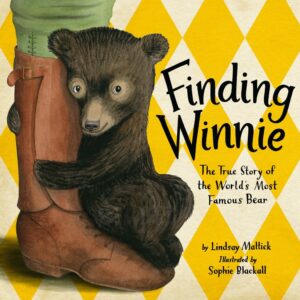We began
our last meeting with a discussion of the picture book, Finding Winnie
by Lindsay Mattick and illustrated by Sophie Blackall. Although we all came
prepared to say quite good things about this book, one of our members produced
and then read aloud to us another book on the exact same
subject/situation: Winnie: The True Story of the Bear who Inspired Winnie
the Pooh, written & illustrated by Sally M. Walker. Wow! It ended up
being a 'compare and contrast' discussion between these two terrific, but very
different picture books which told the story of a real bear cub who was
purchased for $20 in Canada, accompanied Harry Colebourn, a veterinarian for the
Canadian army to a camp in Europe during World War I, and ended up in the London
Zoo where she was discovered by Christopher Robin and his father A.A. Milne. We
felt that the first book, presented as a story being told to Colebourn's
toddler-looking great-great-grandson, Cole, was sweet in intention with some
quite poetically written passages, but that the many interruptions where Cole's
mom was actually telling him the story were annoying and broke the mood of the
actual story of Winnie. In the second book the story was told in a
matter-of-fact, well-written, linear style, and contained many more details
about Harry and Winnie, and we felt it would be better understood by young
readers or as a read-aloud. It also contained back matter that provided many
more details, which the first book lacked. We liked the illustrations in both
books for various reasons, although we felt that a couple by Blackall (in the
first book) didn't maintain the same mood as some of her others did. We also
liked the fact that both included a ' photo album' format: presenting actual
photos of Harry, Winnie, the soldiers, C. Robin, and even Milne that gave
complete credence to Winnie's story. Finally...we discussed the fact that when
Winnie was in the London Zoo, children (including CR) were allowed to come into
her cage and play with her!! This would obviously never happen today, and we
talked about the concept of 'adopting' wild animals, and how this wasn't such a
great idea for 'regular' people. A couple of people felt that there should have
been a "don't try this at home" caveat. Verdict: two very different, but quite
good books on an interesting subject.
We all
liked the novel, A Crooked Kind of Perfect by Linda Urban. We felt that
although the family in the story could have been perceived as dysfunctional,
with an unemployed dad who didn't like to leave the house and was basically
afraid of people, a workaholic mom, and the 11-year-old protagonist, Zoe, who
pretty much had to fend for herself, the story was actually very positive as it
showed how these three people loved, understood, and truly communicated with
each other...although probably in quite nontraditional ways. We all agreed that
at first we didn't much care about what was going on -- Zoe wanted a piano but
got an old model electric organ; she entered a competition; she worried about
whether her parents would attend; she had a weird friend who followed her home
an hung out in the kitchen baking with her dad...etc., but that as the story
developed, we began to care more and more about Zoe, and were all in her corner.
We felt that Zoe's voice was authentic as she continually learned about getting
along in the world, where although things aren't always what you hope for, they
can end up good anyway. We loved the character of Wheeler, Zoe's schoolmate who
had connected with her dad, and was almost a mentor/cheering section for him,
and although one of our members thought it was completely predictable, we mostly
liked the way the story ended with her getting a piano and her dad getting a job
that he could handle. Pretty much positive feelings all around, and we enjoyed
reading a book without a lot of angst and insoluble problems (for a
change!)


No comments:
Post a Comment